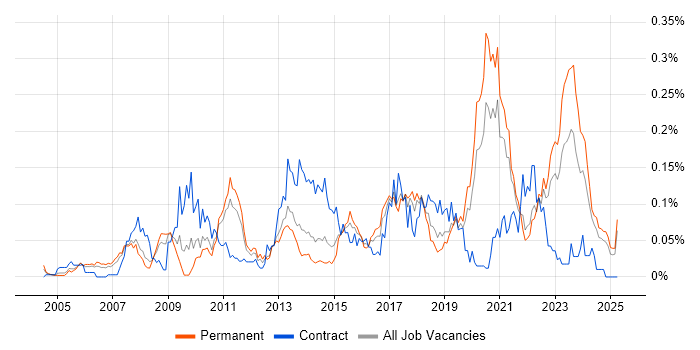Failover Clustering (High-Availability, HA)
England > North of England
The table below provides summary statistics for permanent job vacancies advertised in the North of England requiring Failover Clustering skills. It includes a benchmarking guide to the annual salaries offered in vacancies that cited Failover Clustering over the 6 months leading up to 12 July 2025, comparing them to the same period in the previous two years.
| 6 months to 12 Jul 2025 |
Same period 2024 | Same period 2023 | |
|---|---|---|---|
| Rank | 346 | 371 | 369 |
| Rank change year-on-year | +25 | -2 | +82 |
| Permanent jobs citing Failover Clustering | 5 | 21 | 31 |
| As % of all permanent jobs advertised in the North of England | 0.038% | 0.11% | 0.22% |
| As % of the Systems Management category | 0.34% | 1.55% | 1.69% |
| Number of salaries quoted | 3 | 18 | 23 |
| 10th Percentile | - | £25,500 | - |
| 25th Percentile | - | £30,375 | £32,200 |
| Median annual salary (50th Percentile) | £70,000 | £42,000 | £34,500 |
| Median % change year-on-year | +66.67% | +21.74% | -37.27% |
| 75th Percentile | - | £46,311 | £44,500 |
| 90th Percentile | - | - | £61,250 |
| England median annual salary | £70,000 | £44,274 | £44,250 |
| % change year-on-year | +58.11% | +0.05% | -11.50% |
All Systems Management Skills
North of England
Failover Clustering falls under the Systems Management category. For comparison with the information above, the following table provides summary statistics for all permanent job vacancies requiring systems management skills in the North of England.
| Permanent vacancies with a requirement for systems management skills | 1,478 | 1,359 | 1,837 |
| As % of all permanent jobs advertised in the North of England | 11.20% | 7.22% | 12.93% |
| Number of salaries quoted | 513 | 999 | 1,238 |
| 10th Percentile | £28,500 | £29,000 | £31,995 |
| 25th Percentile | £36,750 | £38,890 | £45,000 |
| Median annual salary (50th Percentile) | £65,000 | £55,000 | £60,000 |
| Median % change year-on-year | +18.18% | -8.33% | +4.35% |
| 75th Percentile | £77,500 | £69,500 | £76,250 |
| 90th Percentile | £94,756 | £81,250 | £86,250 |
| England median annual salary | £67,500 | £62,500 | £67,500 |
| % change year-on-year | +8.00% | -7.41% | -3.57% |
Failover Clustering
Job Vacancy Trend in the North of England
Job postings citing Failover Clustering as a proportion of all IT jobs advertised in the North of England.

Failover Clustering
Salary Trend in the North of England
3-month moving average salary quoted in jobs citing Failover Clustering in the North of England.
Failover Clustering
Job Locations in the North of England
The table below looks at the demand and provides a guide to the median salaries quoted in IT jobs citing Failover Clustering within the North of England region over the 6 months to 12 July 2025. The 'Rank Change' column provides an indication of the change in demand within each location based on the same 6 month period last year.
| Location | Rank Change on Same Period Last Year |
Matching Permanent IT Job Ads |
Median Salary Past 6 Months |
Median Salary % Change on Same Period Last Year |
Live Jobs |
|---|---|---|---|---|---|
| North West | +11 | 3 | £70,000 | +58.11% | |
| Yorkshire | +36 | 2 | - | - | |
| Failover Clustering England |
|||||
Failover Clustering
Co-occurring Skills and Capabilities in the North of England by Category
The follow tables expand on the table above by listing co-occurrences grouped by category. The same employment type, locality and period is covered with up to 20 co-occurrences shown in each of the following categories:
